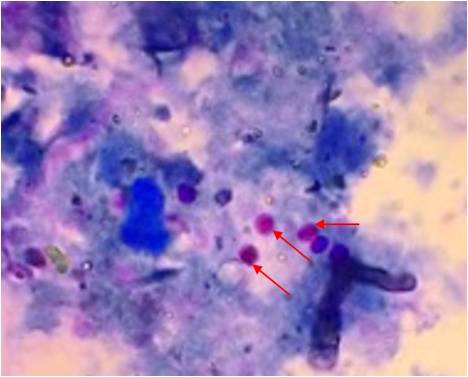Abstract
Cryptosporidiosis is a zoonotic protozoan parasitic disease caused by coccidial species of the genus Cryptosporidium. Oocysts from this parasite can be found and transmitted to human via contaminated raw vegetables, fruits and water. Hence, this study was carried out to investigate the presence of Cryptosporidium oocysts in vegetables collected from the rural market in Selangor, Malaysia. The study was carried out from May (dry season) until October 2017 (wet season). Approximately 250 grams of fresh leafy vegetables such as Centella (Centella Asiatica), water spinach (Ipomoea aquatica), celery (Apium graveolens), spring onion (Allium fistulosum) and Vietnamese coriander (Persicaria odorata) were collected separately and investigated for Cryptosporidium oocysts using the microscopic technique. Among all of the collected vegetables, water spinach (Ipomoea aquatica) showed the presence of Cryptosporidium oocysts during the wet season. Findings of this study depict the possibilities of this vegetable in the transmission of cryptosporidiosis among the consumers. Future study is needed to explore more vegetables from rural markets in Selangor to detect the presence of Cryptosporidium parasites as a public health safety precaution.
Full text article
Generated from XML file
Authors
Mehru Nisha, Nur Atikah Amira, Nurul Nadiah, Ahmad Shakir Mohd Saudi, Norhaida Che Azmi, & Fabian Davamani. (2023). Investigation of Cryptosporidium Oocysts in Vegetables Collected from Rural Market in Selangor, Malaysia. International Journal of Research in Pharmaceutical Sciences, 9((SPL 2), 95–97. Retrieved from https://ijrps.com/home/article/view/4520
Copyright (c) 2018 International Journal of Research in Pharmaceutical Sciences

This work is licensed under a Creative Commons Attribution-NonCommercial-NoDerivatives 4.0 International License.

